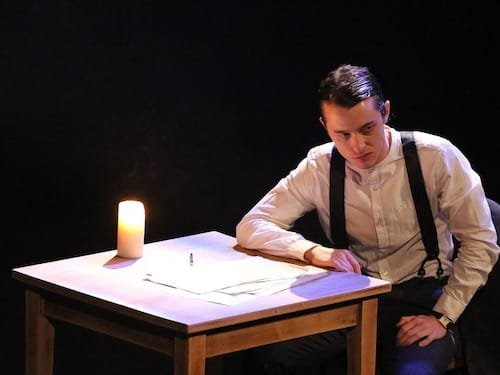
For many people – many of us, anyway – a love for the works of Edgar Allan Poe is practically a rite of passage. At a certain age, young readers with – shall we say – a kind of in-built love for the darker side will almost inevitably find their way to Poe. And, once you’re a fan of Poe, it seems you’re a fan for life. No one disavows him; even if you come to appreciate some of his pitch-dark humour a little more as an adult, or if you move onto other authors and genres, it almost never seems to cancel out the initial impact that this singular author has on his audience. It’s historically been a large audience, too. His appeal has lasted for almost 200 years: at the time of writing, Poe has been in print, in some form or another, since 1827.
Performer and director Stephen Smith is a Poe fan for whom the lifelong appeal has recently taken a fairly unusual form. Growing up with the usual fascination with Poe’s body of work (and Poe-inspired cinema), he has made some of the author’s most seminal works into the basis for a solo dramatic performance. Perhaps ‘unusual form’ is an overstatement: whilst Poe’s work has indeed formed the basis for drama in the past, it almost feels like his introspective, first-person narratives are practically designed for the stage; in that respect, it’s strange we haven’t seen even more Poe adapted as drama. Smith’s approach to adapting Poe is both straightforward, and mind-blowingly challenging: he has learned Poe’s words across four stories verbatim – around 13,000 words in total. His staging and costumes are fairly minimal, which allows ample space for Poe’s own words to engage – and horrify – the listener.
The show took place at the tucked-away York Medical Society – a Grade II listed building which has functioned as a training and lecture hall space since it was built in 1832 (at around the time that Poe was court martialled out of West Point, spending the rest of his adult life as a struggling writer). Like many places in York, you’d walk past it a thousand times without realising its existence – but it is worth seeking out on its own terms, as it’s a beautiful place characteristically heaving with points of historical interest: portraits, medical equipment, even a tally of benefactors which pre-dates the YMS itself. Smith used one of the small lecture spaces for the show, making use of the stage and lectern as minor props; other dramatic effects come mainly from low-key costume changes and lighting, together with some use of accompanying audio (lighting and sound effects are managed by Smith’s wife and assistant, Stephanie).
The stories chosen for the show are: The Tell-Tale Heart, The Pit and the Pendulum, The Black Cat and – switching to poetry at the end – The Raven. Smith does terrific work at lending each of the stories the appropriate blend of gravitas and mania; none of Poe’s protagonists are particularly grounded, although Smith manages to lend each of them a somewhat different flavour of madness. The Tell-Tale Heart is a classic Poe monologue about a man desperately trying to prove his sanity as he proves his insanity, as he discusses his brutal murder of a neighbour (and his subsequent nagging, self-destroying guilt). This is Smith’s most unhinged character; even the victim in The Pit and the Pendulum only just about approaches these levels. Of all four individual performances, The Pit and the Pendulum was, for me, the most challenging one, as so much of the protagonist’s miseries come from external sources – however, Smith does a decent job of constructing this external world.
However, the performance of The Black Cat was my personal favourite. This was the most restrained character overall, which only serves to underline how vile this particular man truly is. As a pre-teen, I remember putting the book down in disgust when I read about what he does to Pluto the cat – I’d go so far as to say it helped shape my outrage at the kinds of people who harm animals, particularly animals which trust them, and this is something which has lasted a lifetime. Understanding that people who are cruel to animals often abuse people, too, is one of many examples of Poe displaying a prescient understanding of the darkest depths of human behaviour – including alcoholism, which is a key factor in this man’s catastrophic collapse. But, dipsomaniac or not, never has one of his characters deserved the terror they go on to feel; Smith does great work here. As the concluding element, The Raven really benefits from being read aloud, too: there’s a nice bit of circularity in Smith’s depiction of The Raven’s narrator as an old man who seems awfully similar to one of the characters already encountered…other than that, Poe’s poem about the horrible realisation that the good times are gone forever, full of its internal rhymes and cleverly-spring lines, works its magic best when appreciated this way.
Fans of Poe will obviously enthuse about this show; even those unfamiliar with Poe’s work, though, will appreciate the great feat of learning and acting which this low-key but highly effective show delivers. Smith has worked incredibly hard to bring this together and there’s so much to be proud of here. If you’re UK-based and intending to visit the Edinburgh Fringe this year, then you could catch the show there: to check out other shows, as well as Smith’s other current projects, then please check out this site for more.
